While the S&P 500 has slowly churned — seemingly nowhere — for the last two weeks, know there is plenty of rotation going on under the surface. The summer markets may look slow, but portfolio managers are busily adjusting their portfolios to improve their second half positioning.
This earnings period will give many an added excuse to leave names that aren’t working and find others that are responding. You can see it in the follow-through performances of those companies which have posted great earnings and improved guidance in the last few weeks.
Technology stocks currently have the upper hand after the quarterly releases of Texas Instruments (NASDAQ:TXN), Apple (NASDAQ:AAPL), Google (NASDAQ:GOOGL) and Facebook (NASDAQ:FB).
It is easy to see how large active investors could choose to make a big second half bet on tech stocks at the expense of their Staples, Utilities, Energy and Bonds which may have carried them during the first half. And with the Fed looking on hold for future rate hikes, a stable U.S. dollar has also made Emerging Market stocks and bonds more attractive than others given their discounted valuations.
It isn’t all blue skies. Oil is rolling over and it is taking Energy stocks with it. Junk bond credits are also feeling some impact. A lot of money has bought into the bounce in energy for 2016. (Anadarko even talking $70 crude last week). It would be difficult for most of those dollars to leave given so much was invested into private assets and vehicles.
However there is always a chance for a decent sized pullback in public valuations if crude oil tries to revisit the $30s. The question will be whether or not weakness in energy will impact the total market, or if it will energy bets reallocate into other sectors. Given all the interest in the Q2 earnings reports as well as the buying strength post-Brexit, I still think the money stays in equities and finds new stocks.
Earnings beats continue to run at a high level for this Q2 reporting period. And stocks are following those earnings beats…
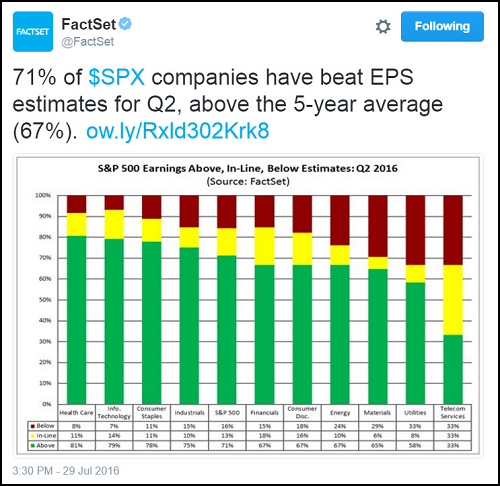
No surprise that Tech and Healthcare have led July’s performance given that is where the most earnings beats are…
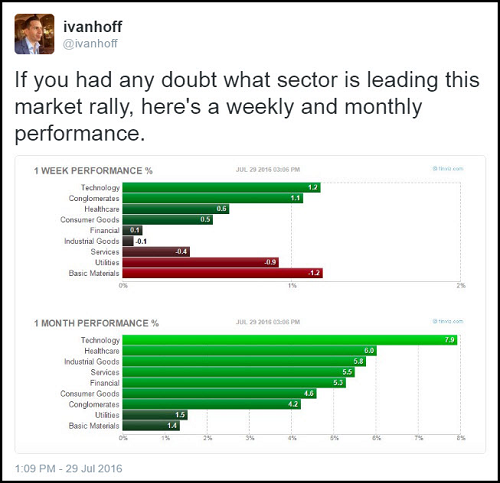
Digging further, Mining, Semis and Biotech have seen the best sub sector buying during this earnings season…
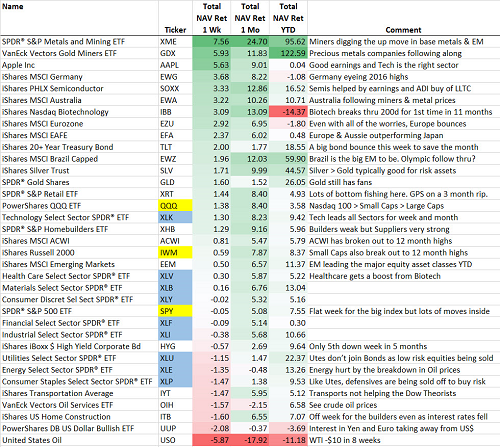
On the economy, we had some good U.S. housing data last week but the Q2 GDP was a bit of a surprise…
Second-quarter GDP came in at only 1.2%, less than half the expected 2.6% rate. Along with benchmark revisions, growth has been around or under 1% for three straight quarters. Consumer spending was relatively strong, but business spending was weak. It almost certainly means the Fed won’t be raising rates in September, and it’s a legitimate question now whether or not the bank will raise rates at all in 2016.
On Sunday night, the Fed’s Dudley talked about the risk of raising rates too soon…
The Federal Reserve should be cautious on interest rate increases due to lingering risks to the U.S. economy, one of its most influential policymakers said on Monday, appearing to signal the chance of a hike by the end of the year was fading.
While New York Fed President William Dudley said it was “premature” to rule out a policy tightening in 2016, he added that negative shocks were more likely than positive ones due to the unknown fallout from Britain’s vote to leave the European Union and a strong dollar.
“All three of these reasons – evidence that U.S. monetary policy is currently only moderately accommodative, the fact that U.S. financial conditions have been influenced by economic and financial market developments abroad, and risk management considerations – argue, at the moment, for caution in raising U.S. short-term interest rates,” said Dudley, a close ally of Fed Chair Janet Yellen and a permanent voter on U.S. policy.
As Fed rate hike expectations continue to diminish, Emerging Market equities should continue to outperform…
EM stocks have even ignored the recent pullback in energy prices on which several EM economies are more dependent.
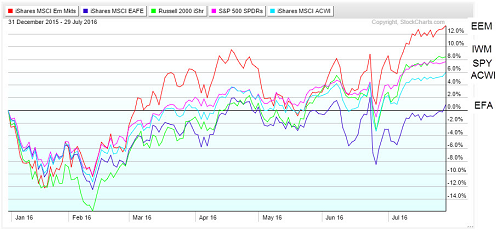
Some earnings highlights starting with Texas Instruments…
“Revenue and earnings per share for the quarter were solidly in the upper half of our expected range. Compared with a year ago, demand for our products continued to be strong in the automotive market, and grew in the industrial and communications equipment markets. Despite sequential growth, demand in the personal electronics market was down from a year ago.”
And no deceleration in the core trends at Facebook…
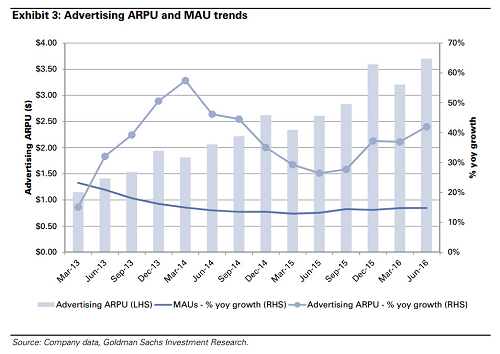
Over at Amazon (NASDAQ:AMZN), I nominate Jeff Bezos as the President of Labor…
Amazon said it added approximately 23,700 employees worldwide in the second quarter, bringing its total employment to 268,900.
Amazon’s headcount has grown by a staggering amount over the last few years. Its employment numbers increased close to 10 percent in the last three months and 47 percent over a year ago, when its employee count stood at a paltry-by-comparison 183,100 people. That’s an increase of 85,800 employees in one year — more than the entire city of Bellingham, Wash.
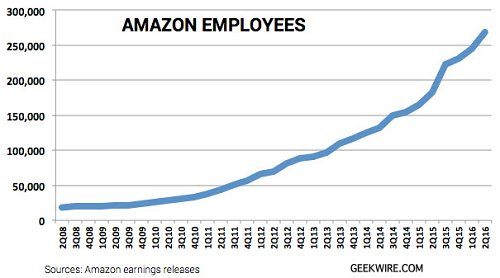
Even with their amazing headcount and fulfillment center growth, Amazon can no longer invest all of its cash flows…
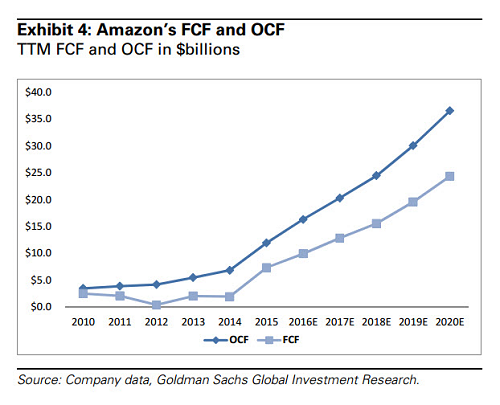
An interesting glance at Global Healthcare vs. Global Staples valuations from J.P. Morgan…
Moving some of your big profits from Staples into Healthcare seems like an easy button to push in the current market.
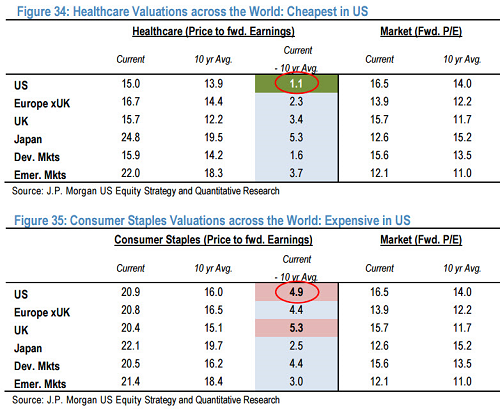
Looking at the Oil vs. High Yield chart shows the recent dislocation. Will oil stop falling or will junk bonds move lower to correct?
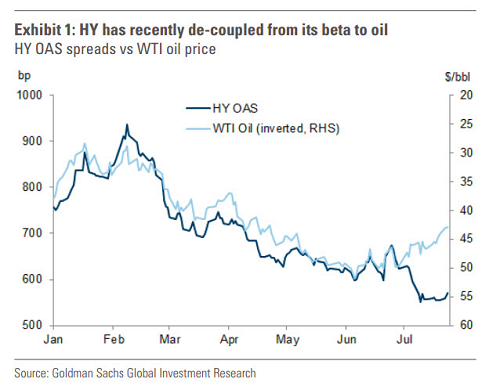
Don’t expect to hear anything good out of Pension Plans as they report their June 2016 results…
The new lows in interest rates will only increase the cost of their pension liabilities (what they owe to retirees), while their investment returns for the past 12 months are nowhere hear the 7% that they are planning on earning over the next 30 years. Governors, mayors and all municipal elected officials will need extra bottles of Maalox for their future budgeting sessions as they deal with the number one issue to hit State and City capitols in the future.
The drop in 20-year annualized returns is significant because officials who oversee retirements for police officers, firefighters, teachers and government workers have long said one bad year or two isn’t as important as the long-term average, and they would earn enough money over decades to pay for retiree obligations.
Those long-term returns have dropped below expectations due in large part to two recessions over the past 15 years and a sustained period of low interest rates. Pension funds invest heavily in fixed-income securities, so the loss of a few percentage points of bond yield hinders their ability to post steady returns.
Funding shortcomings often mean taxpayers or workers are asked to chip in more to account for rising liabilities. Every one-percentage-point drop in investment returns represents an increase of 12% in liabilities, according to the Center for Retirement Research at Boston College.
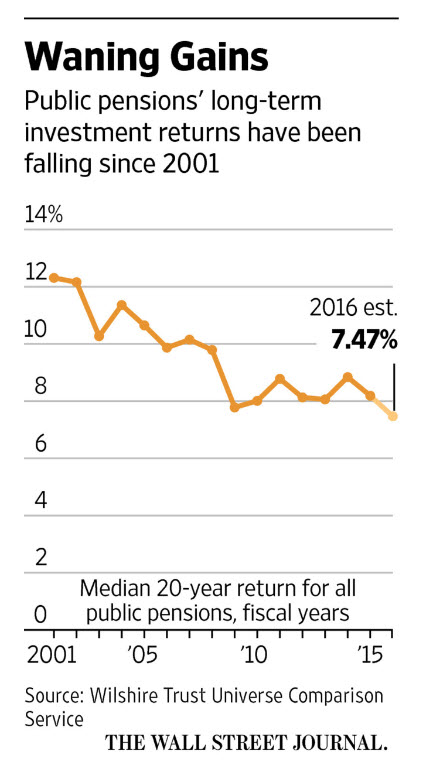
If State and City officials wanted to come clean with all of their public pensioners, they should just move to target a planned 5% investment return assumption and then shoot to surprise on the upside…
According to BlackRock Inc. (NYSE:BLK), it’s going to be really hard for any asset class to give investors returns above a mere 6 percent in the coming years. In fact, according to BlackRock Inc.’s Global Chief Investment Strategist Richard Turnill, most won’t even scrape 5 percent.
“Our five-year return assumptions have steadily moved lower since the financial crisis, amid weak global growth prospects, easy monetary policy and rising valuations,” he writes. “We have lowered our assumed returns for most fixed income assets, following a drop in yields (and rise in valuations) in the second quarter.”
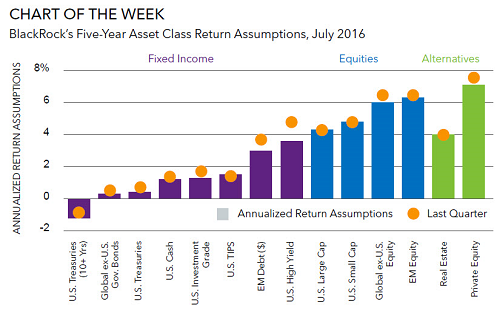
To take return expectations even more negative, look to DoubleLine…
“The artist Christopher Wool has a word painting, ‘Sell the house, sell the car, sell the kids.’ That’s exactly how I feel – sell everything. Nothing here looks good,” Gundlach said in a telephone interview.
Gundlach, who oversees more than $100 billion at Los Angeles-based DoubleLine, said that the firm went “maximum negative” on Treasuries on July 6 when the yield on the benchmark 10-year Treasury note hit 1.32 percent.
“We never short in our mainline strategies. We also never go to zero Treasuries. We went to lower weightings and change the duration,” Gundlach said.
Deutsche Bank (DE:DBKGn) has an updated Global AUM chart for you…
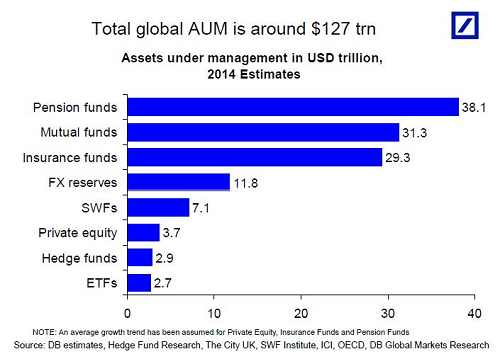
We have written much about the rise of self-driving cars…
Good to see the WSJ write about the future of the auto insurance industry. While the number of accidents are sure to decline significantly, what is more important is that the severity of the accidents will fall further. The most expensive auto insurance claims are those of a severe nature that require hospitalization of the passengers.
As self-driving slows traffic and avoids accidents, severity will decline and 6-7 figure losses will disappear. The big drop in auto insurance losses will lead to an equally big drop in premium pricing. Why do you think Flo is so anxious to insure your boat?
The insurance industry has a $160 billion blind spot: the driverless car.
Car insurers last year hauled in $200 billion of premiums, about a third of all premiums collected by the property-casualty industry. But as much as 80% of the intake could evaporate in coming decades, say some consultants, assuming crucial breakthroughs in driverless technology make driving safer and propel big changes in car ownership.
As the threat approaches, U.S. insurance executives are spending millions and embedding with car companies, testing the technology themselves, and wrestling with whether to lower prices as parts of the autonomous future hit America’s roads.
For the actuaries who set insurance rates, it is a puzzle like no other: How do they prepare for a world of so many fewer auto accidents? In the future, will underwriters be insuring drivers or computer code?
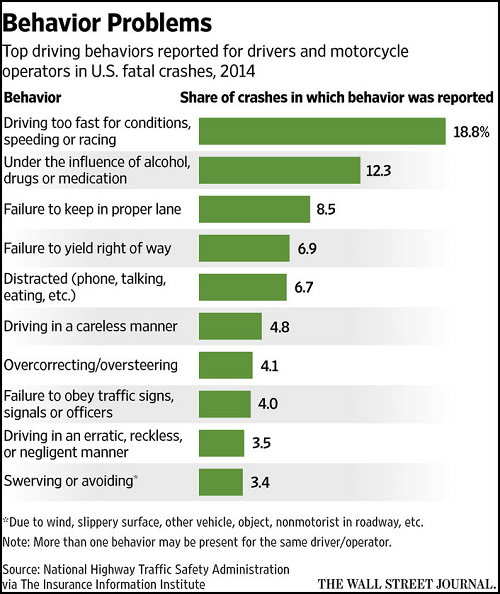
With the euro down big, this was supposed to be Europe’s year for a tourism spike. If you love Europe, now is the time to buy a ticket because they would love your business.
At the Mont-Saint-Michel, a spectacular medieval abbey that is one of France’s top tourist destinations, business at the Sodetour Group, a chain of local hotels and restaurants, slumped by up to 70 percent for months after the Nov. 13 terrorist attacks in Paris. It has never fully recovered.
American and Japanese visitors in particular canceled reservations, even though the site, perched on an isolated rock off the northwest coast of Normandy, is far from Paris. Gilles Gohier, the chief executive, said he had to tell nearly a third of his 230 employees to go home for four months, and temporarily shut half of his five hotels and four restaurants. Since then, he has eliminated 17 positions and is hiring new employees only on temporary contracts.
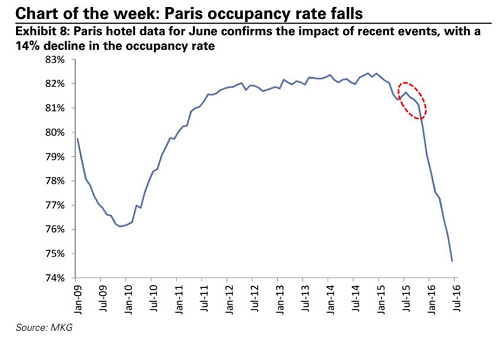
Disclaimer: The information presented here is for informational purposes only, and this document is not to be construed as an offer to sell, or the solicitation of an offer to buy, securities. Some investments are not suitable for all investors, and there can be no assurance that any investment strategy will be successful. The hyperlinks included in this message provide direct access to other Internet resources, including Web sites. While we believe this information to be from reliable sources, 361 Capital is not responsible for the accuracy or content of information contained in these sites. Although we make every effort to ensure these links are accurate, up to date and relevant, we cannot take responsibility for pages maintained by external providers. The views expressed by these external providers on their own Web pages or on external sites they link to are not necessarily those of 361 Capital.
